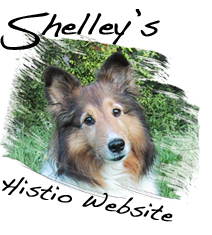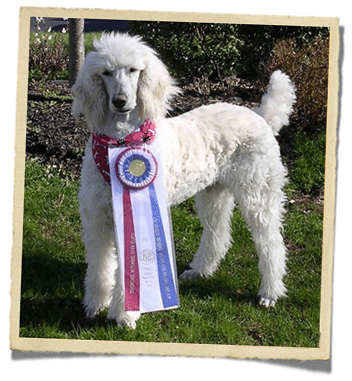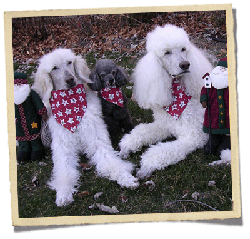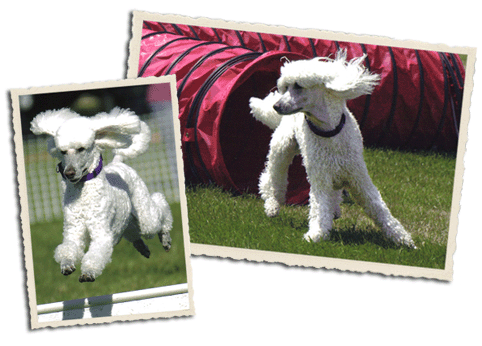
HOME
 YOUR HISTIO STORY
YOUR HISTIO STORY
I am looking for similarities
in all individual cases of
Histiocytic diseases.
I wonder if we all tell our
stories we might come up
with some commonality
between the specific
situations in which all of
our pets got this disease.
So please email me the
details and I'll put your
pets story on Shelley's
Histio Website
 UW HISTIO VERHAAL
UW HISTIO VERHAAL
Ik ben op zoek naar
overeenkomsten in alle
individuele gevallen van
Histiocytose.
Ik hoop dat wanneer wij
onze Histio verhalen
vertellen, wij overeen-
komsten ontdekken over
de manier waarop onze
huisdieren deze ziekte
hebben opgelopen.
Stuur mij de details en
ik zal het verhaal van uw
huisdier op de Histio
website van Shelley zetten.
 WARNING !
WARNING !
These stories are all
different. Individual
symptoms, situations
and circumstances
may vary and response to
therapy is not always the
same.
- Disclaimer -
 WAARSCHUWING !
WAARSCHUWING !
Deze verhalen zijn allemaal
verschillend. Individuele
symptomen, situaties en
omstandigheden kunnen
verschillen en de reactie
op therapie is niet altijd
hetzelfde.
- Disclaimer -
HISTIOCYTOSIS IN
OTHER LANGUAGES
German - Hund
Maligner Histiozytose
French - Chien
l'Histiocytose Maligne
Italian - Canis
Maligni Histiocytosis
Spanish - Perros
Histiocitosis Maligna
Dutch - Hond
Maligne Histiocytose
HOME
Echo
Malignant Histiocytosis
Standard Poodle
Male
(CH Unique Beyond Belief CDX, OA, OAJ, OAP, AJP, RN)
August 25, 1994 - May 17, 2006


Story told by Suzanne Haber
I am writing this story to hopefully help someone else decide what to do for their friend when faced with the horrible diagnosis of Malignant Histiocytosis. Echo's story is a little different from the rest because Echo defied the 4 month prognosis and lived 2 years playing and wagging his tail.
Echo was a wonderful dog. He was my once in a lifetime dog. He was always wagging his tail, happy for anything we did together, and always happy to see his friends (two and four legged alike!) Echo and I did many things together. He loved going to school for obedience and agility and then dog shows. He would stand tall and proud and wag his tail constantly. He loved running in agility and everyone always stopped me after to say how much they enjoyed watching him because he looked so graceful and looked like he was having so much fun.
In April 2004, we were having a great start to the agility season.  Echo, now 9-1/2 years old, was running faster and happier than ever. We had been at the agility show all weekend and for him to be a little tired didn't seem anything to worry about. When I came home from work the next day, Echo was not himself. He was usually playful when I came home from work and this day he was not. I thought maybe he caught something at the dog show so I called the vet and took him over to be checked. I really didn't think anything serious was wrong, maybe kennel cough or some doggy virus. The vet said he had enlarged lymph nodes and a fever and she didn't want to think of the "C" word; I didn't even know what "C" word she meant. How could a healthy looking dog running and jumping in agility have cancer I thought. We were sent down the road to the specialty clinic for tests. They said he probably had lymphoma and we should start treatment right away. I knew a cancer specialist in the area and wanted to take him there so I made and appointment for the following Monday, but when I got up on Friday and felt Echo, he was burning up. I called the hospital and they let me bring him right over. They gave him chilled IV fluids to bring down his fever (around 107) They also did a bone marrow biopsy to find out what was wrong with him. They said it was either lymphoma or this other thing that I had never heard of. When the vet came back with the results, she said it was MH and not to go looking on the internet because I would find nothing good about it. She said she had a protocol we would start that day. It was to be for five days every three weeks. All the other dogs coming in and out of the office seemed happy, so I decided to start the treatment.
Echo, now 9-1/2 years old, was running faster and happier than ever. We had been at the agility show all weekend and for him to be a little tired didn't seem anything to worry about. When I came home from work the next day, Echo was not himself. He was usually playful when I came home from work and this day he was not. I thought maybe he caught something at the dog show so I called the vet and took him over to be checked. I really didn't think anything serious was wrong, maybe kennel cough or some doggy virus. The vet said he had enlarged lymph nodes and a fever and she didn't want to think of the "C" word; I didn't even know what "C" word she meant. How could a healthy looking dog running and jumping in agility have cancer I thought. We were sent down the road to the specialty clinic for tests. They said he probably had lymphoma and we should start treatment right away. I knew a cancer specialist in the area and wanted to take him there so I made and appointment for the following Monday, but when I got up on Friday and felt Echo, he was burning up. I called the hospital and they let me bring him right over. They gave him chilled IV fluids to bring down his fever (around 107) They also did a bone marrow biopsy to find out what was wrong with him. They said it was either lymphoma or this other thing that I had never heard of. When the vet came back with the results, she said it was MH and not to go looking on the internet because I would find nothing good about it. She said she had a protocol we would start that day. It was to be for five days every three weeks. All the other dogs coming in and out of the office seemed happy, so I decided to start the treatment.
Echo received three of the five days of chemotherapy, along with medicine for nausea and diarrhea. He received doxorubicin and DTIC (dacarbazine) along with Centrine and Zofran for the nausea and diarrhea. The fourth day his blood count was too low, so they said to come back the next day and they would check again. That night he was very sick with vomiting. I couldn't wait until morning to see the doctor. When we got there, they gave him IV medicine for the vomiting and diarrhea as well as heavy duty antibiotics for infection (Primaxin). We were there all day and he was pretty sick, getting IV's all day. Close to 5pm they said we would have to take him to an emergency clinic overnight for the IV's. I was in a panic; I was not near home and didn't know the area, so I called some friends and they said their vet would take him. By the time we got to the other vet, Echo was just laying there and had to be carried in. His bloodwork showed he had almost no white blood cells and that was why he was so sick. The doctor said to give him a chance to get his white blood cells back up and he would feel a lot better. They gave him Neupogen to bring his WBC up and continued the Primaxin for the infection, as well as Zofran and Centrine for the nausea and diarrhea and he started to look much better. I knew he was a strong dog and had to laugh at him because I would go visit and walk him outside with his IV's and he would walk to the parking lot and try to get in the car. He knew his car and he was ready to go home. Finally after one week in the hospital, Echo was doing much better and was ready to go home.
I knew I could not make Echo that sick again and we would probably not continue treatment, but our new doctor assured me we could give Echo a modified treatment with lower doses and less often so he would not be sick. I didn't even want to talk about it, so we went home to regroup and build Echo's strength back. When we went back to the doctor a few weeks later, Echo was doing well and his blood count was much better. I decided to try the modified treatment once more to see how it would be and Echo went for the day and received doxorubicin IV and came home with Zofran pills and Centrine for any nausea or diarrhea. They also gave him prednisone 20mg every other day and Doxycycline 100mg twice a day. They said it wouldn't be like before; that he might skip one meal a few days later and that would be the worst of it and luckily they were right. Also, as we soon found out, Echo lost his hair and turned an orange tint due to the doxorubicin., but he was happy and eating well and running and playing, so I thought we could give this a try.
 Echo continued to get the treatment with the doxorubicin IV for awhile. It started once every three weeks, then every month, then every six weeks. The longer between treatments allowed his hair to grow back and start looking like himself. This went on until the end of the summer and Echo was happy and going to school and shows like he loved, and his friends all came to a happy 10th birthday party for him.
Echo continued to get the treatment with the doxorubicin IV for awhile. It started once every three weeks, then every month, then every six weeks. The longer between treatments allowed his hair to grow back and start looking like himself. This went on until the end of the summer and Echo was happy and going to school and shows like he loved, and his friends all came to a happy 10th birthday party for him.
Around the beginning of 2005, Echo had received many doses of doxorubicin, which has a cumulative toxicity to the heart. Echo's doctor did not want to use up his limit of this drug, so he wanted to alternate with another drug, Lomustine, which came in a capsule. The Lomustine was very easy to give him; he preferred it in a McDonald's cheeseburger! And it never made him miss a meal so it was good to alternate and go almost three months without any IV drugs or nausea medicine.
Echo was doing very well one year after his diagnosis. He was still taking the prednisone every other day and the doxycycline twice a day and the Lomustine alternating with the doxorubicin about every two months. I decided to take him to some Rally obedience shows and in June 2005, he got his Novice Rally title at the Poodle National Specialty show. I was so proud of him and so glad to have him with me. I have the picture from that show I will always treasure. He had so much fun and enjoyed being there, I am so glad we went.
Towards the end of 2005, I noticed blood on the sides of the counter and found it coming from Echo's nose. It was not a lot, but I knew it was probably not good. He had also developed a cough, which could have been from the doxorubicin causing a slight heart murmur. He was still happy and wagging his tail and always ready for a meal. Over the last year, Echo's meals had become almost all chicken, which was his favorite!
I took Echo as many places as I could during this time. He loved seeing his friends and would wag constantly. I took him to what would be his last show to visit in March 2006 and he had a grand time strutting out in front, still turning heads as he went by. His cough was getting worse and his nose bleeding more often but he was still playing and happy to eat. But then in May 2006, Echo started to cough a lot and they tried a few new medicines, theophylline and enalapril, which didn't help. Then he started not wanting to take his pills and acting different and I knew the time was near. Echo went in peace in my arms May 17, 2006. I did my best for him, as he always did for me. I hope I made the right choices and I tried to let him tell me when to fight. I thank Mo for her constant support and her website and I hope my telling Echo's story will help someone else.

